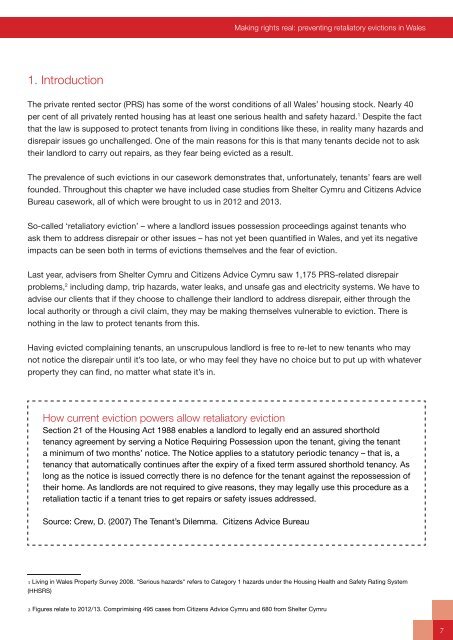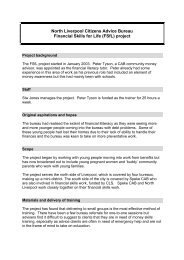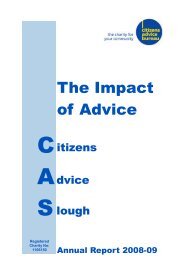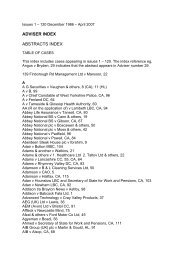Retaliatory eviction - Citizens Advice
Retaliatory eviction - Citizens Advice
Retaliatory eviction - Citizens Advice
You also want an ePaper? Increase the reach of your titles
YUMPU automatically turns print PDFs into web optimized ePapers that Google loves.
Making rights real: preventing retaliatory <strong>eviction</strong>s in Wales1. IntroductionThe private rented sector (PRS) has some of the worst conditions of all Wales’ housing stock. Nearly 40per cent of all privately rented housing has at least one serious health and safety hazard. 1 Despite the factthat the law is supposed to protect tenants from living in conditions like these, in reality many hazards anddisrepair issues go unchallenged. One of the main reasons for this is that many tenants decide not to asktheir landlord to carry out repairs, as they fear being evicted as a result.The prevalence of such <strong>eviction</strong>s in our casework demonstrates that, unfortunately, tenants’ fears are wellfounded. Throughout this chapter we have included case studies from Shelter Cymru and <strong>Citizens</strong> <strong>Advice</strong>Bureau casework, all of which were brought to us in 2012 and 2013.So-called ‘retaliatory <strong>eviction</strong>’ – where a landlord issues possession proceedings against tenants whoask them to address disrepair or other issues – has not yet been quantified in Wales, and yet its negativeimpacts can be seen both in terms of <strong>eviction</strong>s themselves and the fear of <strong>eviction</strong>.Last year, advisers from Shelter Cymru and <strong>Citizens</strong> <strong>Advice</strong> Cymru saw 1,175 PRS-related disrepairproblems, 2 including damp, trip hazards, water leaks, and unsafe gas and electricity systems. We have toadvise our clients that if they choose to challenge their landlord to address disrepair, either through thelocal authority or through a civil claim, they may be making themselves vulnerable to <strong>eviction</strong>. There isnothing in the law to protect tenants from this.Having evicted complaining tenants, an unscrupulous landlord is free to re-let to new tenants who maynot notice the disrepair until it’s too late, or who may feel they have no choice but to put up with whateverproperty they can find, no matter what state it’s in.How current <strong>eviction</strong> powers allow retaliatory <strong>eviction</strong>Section 21 of the Housing Act 1988 enables a landlord to legally end an assured shortholdtenancy agreement by serving a Notice Requiring Possession upon the tenant, giving the tenanta minimum of two months’ notice. The Notice applies to a statutory periodic tenancy – that is, atenancy that automatically continues after the expiry of a fixed term assured shorthold tenancy. Aslong as the notice is issued correctly there is no defence for the tenant against the repossession oftheir home. As landlords are not required to give reasons, they may legally use this procedure as aretaliation tactic if a tenant tries to get repairs or safety issues addressed.Source: Crew, D. (2007) The Tenant’s Dilemma. <strong>Citizens</strong> <strong>Advice</strong> Bureau1 Living in Wales Property Survey 2008. "Serious hazards" refers to Category 1 hazards under the Housing Health and Safety Rating System(HHSRS)2 Figures relate to 2012/13. Comprimising 495 cases from <strong>Citizens</strong> <strong>Advice</strong> Cymru and 680 from Shelter Cymru7




![Annual review [ 1.4 MB] - Citizens Advice](https://img.yumpu.com/50679529/1/190x135/annual-review-14-mb-citizens-advice.jpg?quality=85)

![Help for helping your residents [ 2.4 MB] - Citizens Advice](https://img.yumpu.com/48848542/1/185x260/help-for-helping-your-residents-24-mb-citizens-advice.jpg?quality=85)







